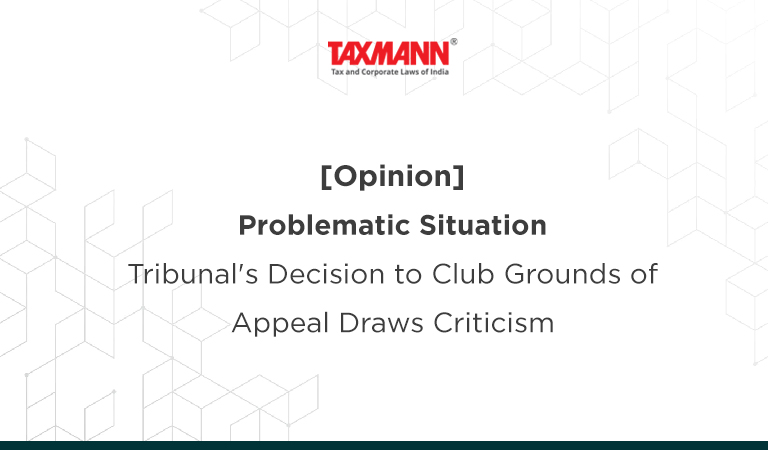[Opinion] Problematic Situation – Tribunal’s Decision to Club Grounds of Appeal Draws Criticism
- Blog|News|Income Tax|
- 2 Min Read
- By Taxmann
- |
- Last Updated on 30 January, 2023

Gopal Nathani – [2023] 146 taxmann.com 489 (Article)
Grounds of appeal
Drafting of Grounds of Appeal in appeal memorandum is key in the preparation of any appeal. Rule 8 of the Income tax (Appellate Tribunal) Rules, 1963 describe the manner of preparation of an appeal as under.
Contents of memorandum of appeal
Every memorandum of appeal shall be written in English and shall set forth, concisely and under distinct heads, the grounds of appeal without any argument or narrative; and such grounds shall be numbered consecutively.
And often the Courts and Tribunal denounce the nebulous practice of including descriptive or argumentative grounds of appeal in the appeal memorandum. Such grounds are not addressed or included in the actual disposal of appeals.
In the case of Pepsico India Holdings (P.) Ltd. v. Asstt. CIT [2023] 30 ITR (Trib.)-OL 1 (ITAT[Del]) the subject matter of appeal was essentially covered by the previous orders of the Tribunal in favour of the assessee company based on which the AO/TPO was asked to delete the transfer pricing adjustment made on account of AMP expenses.
Long list of grounds of appeal
However, there is one aspect that is worth noticing in this case before the Delhi Tribunal and that is as many as 31 grounds of appeal are made out on the single effective subject of AMP expenses Transfer Pricing adjustment out of which as many as 29 grounds are taken as effectively connected to main ground by the Tribunal. Noticeably each of the 29 grounds begins with the words “without prejudice” meaning therefore that each of such grounds explicitly refer to the contention of the assessee company without anything more. For instance, let us take a sample of three such grounds out of 29 which read as under:
“6. Without prejudice, the Transfer Pricing Officer/Dispute Resolution Panel/Assessing Officer erred in observing that the appellant was a subsidiary of Holland based company and was carrying out distribution activities as well as development of marketing intangibles for its associated enterprise (‘AE’), all of which is factually incorrect.
7. Without prejudice, the Transfer Pricing Officer/Dispute Resolution Panel/Assessing Officer erred in ignoring that the appellant was a full-fledged licenced manufacturer in India.
8. Without prejudice, the Transfer Pricing Officer/Dispute Resolution Panel/Assessing Officer erred in ignoring various decisions of the hon’ble jurisdictional High Court/Tribunal, which clearly state that no adjustment can be made on account of AMP expenses in the case of a licenced manufacturer, until and unless the Department demonstrates the existence of an explicit agreement/arrangement between the assessee and its associated enterprise for the purposes of incur ring AMP expenses.”
In a literal sense all of these three grounds raise certain contentions. The Tribunal did not choose to answer such grounds by simply proceeding on the basis that the only effective ground of appeal in the grounds of appeal is in respect of transfer pricing adjustment made on account of advertisement, marketing and promotion (AMP) expenses.
Click Here To Read The Full Article
Disclaimer: The content/information published on the website is only for general information of the user and shall not be construed as legal advice. While the Taxmann has exercised reasonable efforts to ensure the veracity of information/content published, Taxmann shall be under no liability in any manner whatsoever for incorrect information, if any.

Taxmann Publications has a dedicated in-house Research & Editorial Team. This team consists of a team of Chartered Accountants, Company Secretaries, and Lawyers. This team works under the guidance and supervision of editor-in-chief Mr Rakesh Bhargava.
The Research and Editorial Team is responsible for developing reliable and accurate content for the readers. The team follows the six-sigma approach to achieve the benchmark of zero error in its publications and research platforms. The team ensures that the following publication guidelines are thoroughly followed while developing the content:
- The statutory material is obtained only from the authorized and reliable sources
- All the latest developments in the judicial and legislative fields are covered
- Prepare the analytical write-ups on current, controversial, and important issues to help the readers to understand the concept and its implications
- Every content published by Taxmann is complete, accurate and lucid
- All evidence-based statements are supported with proper reference to Section, Circular No., Notification No. or citations
- The golden rules of grammar, style and consistency are thoroughly followed
- Font and size that’s easy to read and remain consistent across all imprint and digital publications are applied



 CA | CS | CMA
CA | CS | CMA
